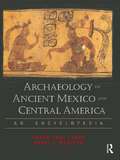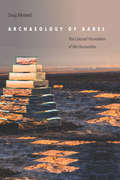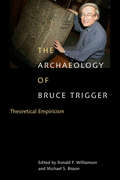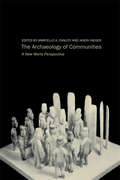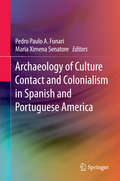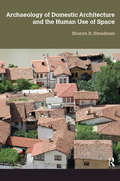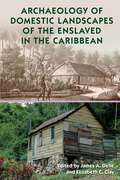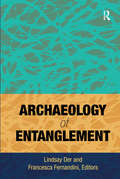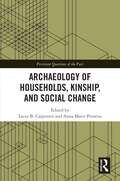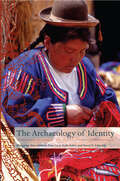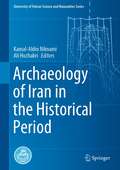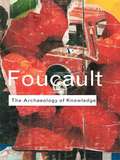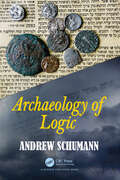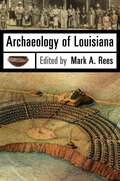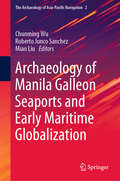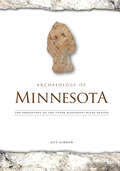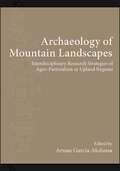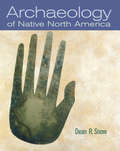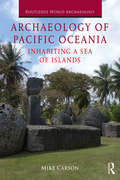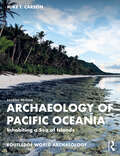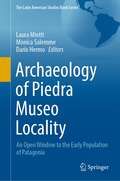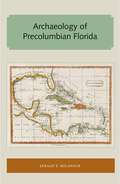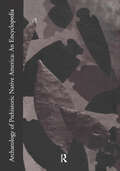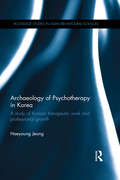- Table View
- List View
Archaeology of Ancient Mexico and Central America: An Encyclopedia
by Susan Toby Evans David L. WebsterThis is the first comprehensive, one-volume encyclopedia in English devoted to pre-Columbian archaeology of the Mesoamerican culture area. In more than 500 articles by the major experts in the field, this work brings the most recent scholarship to an examination of regional environments and their cultural evolution. Entries range from the familiar
Archaeology of Babel: The Colonial Foundation of the Humanities
by Siraj AhmedFor more than three decades, preeminent scholars in comparative literature and postcolonial studies have called for a return to philology as the indispensable basis of critical method in the humanities. Against such calls, this book argues that the privilege philology has always enjoyed within the modern humanities silently reinforces a colonial hierarchy. In fact, each of philology's foundational innovations originally served British rule in India. Tracing an unacknowledged history that extends from British Orientalist Sir William Jones to Palestinian American intellectual Edward Said and beyond, Archaeology of Babel excavates the epistemic transformation that was engendered on a global scale by the colonial reconstruction of native languages, literatures, and law. In the process, it reveals the extent to which even postcolonial studies and European philosophy—not to mention discourses as disparate as Islamic fundamentalism, Hindu nationalism, and global environmentalism—are the progeny of colonial rule. Going further, it unearths the alternate concepts of language and literature that were lost along the way and issues its own call for humanists to reckon with the politics of the philological practices to which they now return.
Archaeology of Bruce Trigger
by Michael S. Bisson Ronald F. WilliamsonIn The Archaeology of Bruce Trigger, leading scholars discuss their own approaches to the interpretation of archaeological data in relation to Trigger's fundamental intellectual contributions
Archaeology of Bruce Trigger: Theoretical Empiricism
by Michael S. Bisson Ronald F. WilliamsonBruce Trigger has merged the history of archaeology with new perspectives on how to understand the past. He is a critical analyst and architect of social evolutionary theory, an Egyptologist, and an authority on aboriginal cultures in north-eastern North America. His contextualization of archaeology within broader society has encouraged appreciation of the power of archaeological knowledge and he has been an effective voice for non-oppositional forms of argument in archaeological theory. In The Archaeology of Bruce Trigger, leading scholars discuss their own approaches to the interpretation of archaeological data in relation to Trigger's fundamental intellectual contributions Contributors include Michael Bisson (McGill), Stephen Chrisomalis (Toronto), Jerimy J. Cunningham (Calgary), Brian Fagan (Lindbrior Corporation), Clare Fawcett (St. Francis Xavier), Junko Habu (California at Berkeley), Ian Hodder (Stanford), Jane Kelley (Calgary), Martha Latta (Toronto), Robert MacDonald (Archaeological Services Inc.), Randall McGuire (Binghamton), Lynn Meskell (Columbia), Toby Morantz (McGill), Robert Pearce (London Museum of Archaeology), David Smith (Toronto), Peter Timmins (Timmins Martelle Heritage Consultants), Silvia Tomásková (North Carolina), Bruce G. Trigger (McGill), Alexander von Gernet (Toronto), Gary Warrick (Wilfrid Laurier), Ronald F. Williamson (Archaeological Services Inc.), Alison Wylie (Washington), and Eldon Yellowhorn (Simon Frasier)
Archaeology of Communities: A New World Perspective (Archaeology Of The American South: New Directions And Perspectives Ser.)
by Marcello-Andrea Canuto Jason Yaeger both atThe Archaeology of Communities develops a critical evaluation of community and shows that it represents more than a mere aggregation of households. This collection bridges the gap between studies of ancient societies and ancient households. The community is taken to represent more than a mere aggregation of households, it exists in part through shared identities, as well as frequent interaction and inter-household integration. Drawing on case studies which range in location from the Mississippi Valley to New Mexico, from the Southern Andes to the Blue Ridge Mountains of Madison County, Virginia, the book explores and discusses communities from a whole range of periods, from Pre-Columbian to the late Classic. Discussions of actual communities are reinforced by strong debate on, for example, the distinction between 'Imagined Community' and 'Natural Community.'
Archaeology of Culture Contact and Colonialism in Spanish and Portuguese America
by Pedro Paulo A. Funari Maria Ximena SenatoreThe volume contributes to disrupt the old grand narrative of cultural contact and colonialism in Spanish and Portuguese America in a wide and complete sense. This edited volume aims at exploring contact archaeology in the modern era. Archaeology has been exploring the interaction of peoples and cultures from early times, but only in the last few decades have cultural contact and material world been recognized as crucial elements to understanding colonialism and the emergence of modernity. Modern colonialism studies pose questions in need of broader answers. This volume explores these answers in Spanish and Portuguese America, comprising present-day Latin America and formerly Spanish territories now part of the United States. The volume addresses studies of the particular features of Spanish-Portuguese colonialism, as well as the specificities of Iberian colonization, including hybridism, religious novelties, medieval and modern social features, all mixed in a variety of ways unique and so different from other areas, particularly the Anglo-Saxon colonial thrust. Cultural contact studies offer a particularly in-depth picture of the uniqueness of Latin America in terms of its cultural mixture. This volume particularly highlights local histories, revealing novelty, diversity, and creativity in the conformation of the new colonial realities, as well as presenting Latin America as a multicultural arena, with astonishing heterogeneity in thoughts, experiences, practices, and, material worlds.
Archaeology of Domestic Architecture and the Human Use of Space
by Sharon R SteadmanThis volume is the first text to focus specifically on the archaeology of domestic architecture. Covering major theoretical and methodological developments over recent decades in areas like social institutions, settlement types, gender, status, and power, this book addresses the developing understanding of where and how people in the past created and used domestic space. It will be a useful synthesis for scholars and an ideal text for advanced undergraduate and graduate courses in archaeology and architecture. The book-covers the relationship of architectural decisions of ancient peoples with our understanding of social and cultural institutions;-includes cases from every continent and all time periods-- from the Paleolithic of Europe to present-day African villages;-is ideal for the growing number of courses on household archaeology, social archaeology, and historical and vernacular architecture.
Archaeology of Domestic Landscapes of the Enslaved in the Caribbean (Florida Museum of Natural History: Ripley P. Bullen Series)
by James A. Delle and Elizabeth C. ClayWhile previous research on household archaeology in the colonial Caribbean has drawn heavily on artifact analysis, this volume provides the first in-depth examination of the architecture of slave housing during this period. It examines the considerations that went into constructing and inhabiting living spaces for the enslaved and reveals the diversity of people and practices in these settings. Contributors present case studies using written descriptions, period illustrations, and standing architecture, in addition to archaeological evidence to illustrate the wide variety of built environments for enslaved populations in places including Jamaica, the Bahamas, and the islands of the Lesser Antilles. They investigate how the enslaved defined their social positions and identities through house, yard, and garden space; they explore what daily life was like for slaves on military compounds; they compare the spatial arrangements of slave villages on plantations based on type of labor; and they show how the style of traditional laborer houses became a form of vernacular architecture still in use today. This volume expands our understanding of the wide range of enslaved experiences across British, French, Dutch, and Danish colonies. Contributors: Elizabeth C. Clay | James A. Delle | Todd M. Ahlman | Marco Meniketti | Kenneth Kelly | Hayden Bassett | James A. Delle | Kristen R. Fellows | Allan D. Meyers | Elizabeth C. Clay | Alicia Odewale | Meredith D. Hardy | Zachary J. M. Beier | Mark W. Hauser A volume in the Florida Museum of Natural History: Ripley P. Bullen Series Publication of the paperback edition made possible by a Sustaining the Humanities through the American Rescue Plan grant from the National Endowment for the Humanities.
Archaeology of Entanglement
by Lindsay Der Francesca FernandiniEntanglement theory posits that the interrelationship of humans and objects is a delimiting characteristic of human history and culture. This edited volume of original studies by leading archaeological theorists applies this concept to a broad range of topics, including archaeological science, heritage, and theory itself. In the theoretical explications and ten case studies, the editors and contributing authors: • build on the intersections between science, humanities and ecology to provide a more fine-grained, multi-scalar treatment emanating from the long-term perspective that characterizes archaeological research; • bring to light the subtle and unacknowledged paths that configure historical circumstances and bind human intentionality; • examine the constructions of personhood, the rigidity of path dependencies, the unpredictable connections between humans and objects and the intricate paths of past events in varied geographic and historical contexts that channel future actions. This broad focus is inclusive of early complex developments in Asia and Europe, imperial and state strategies in the Andes and Mesoamerica, continuities of postcolonialism in North America, and the unforeseen and complex consequences that derive from archaeological practices. This volume will appeal to archaeologists and their advanced students.
Archaeology of Households, Kinship, and Social Change (Persistent Questions of the Past)
by Lacey B. CarpenterArchaeology of Households, Kinship, and Social Change offers new perspectives on the processes of social change from the standpoint of household archaeology. This volume develops new theoretical and methodological approaches to the archaeology of households pursuing three critical themes: household diversity in human residential communities with and without archaeologically identifiable houses, interactions within and between households that explicitly considers impacts of kin and non-kin relationships and lastly change as a process that involves the choices made by members of households in the context of larger societal constraints. Encompassing these themes, authors explore the role of social ties and their material manifestations (within the house, dwelling or other constructed space), how the household relates to other social units, how households consolidate power and control over resources, and how these changes manifest at multiple scales. The case studies presented in this volume have broader implications for understanding the drivers of change, the ways households create the contexts for change, and how households serve as spaces for invention, reaction, and/or resistance. Understanding the nature of relationships within households is necessary for a more complete understanding of communities and regions as these ties are vital to explaining how and why societies change. Taking a comparative outlook, with case studies from around the world, this volume will inform students and professionals researching household archaeology and be of interest to other disciplines concerned with the relationship between social networks and societal change.
Archaeology of Identity
by Margarita Diaz-Andreu Sam LucyBringing together a wealth of scholarship which provides a unique integrated approach to identity, The Archaeology of Identity presents an overview of the five key areas which have recently emerged in archaeological social theory: * gender* age* ethnicity* religion * status. This excellent book reviews the research history of each areas, the different ways in which each has been investigated, and offers new avenues for research and exploring the connections between them. Emphasis is placed on exploring the ways in which material culture structures, and is structured by, these aspects of individual and communal identity, with a particular examination of social practice. Useful for social scientists in sociology, anthropology and history, under- and postgraduates will find this an excellent addition to their course studies.
Archaeology of Iran in the Historical Period (University of Tehran Science and Humanities Series)
by Kamal-Aldin Niknami Ali HozhabriThis collection of twenty-eight essays presents an up-to-date survey of pre-Islamic Iran, from the earliest dynasty of Illam to the end of Sasanian empire, encompassing a rich diversity of peoples and cultures. Historically, Iran served as a bridge between the earlier Near Eastern cultures and the later classical world of the Mediterranean, and had a profound influence on political, military, economic, and cultural aspects of the ancient world. Written by international scholars and drawing mainly on the field of practical archaeology, which traditionally has shared little in the way of theories and methods, the book provides crucial pieces to the puzzle of the national identity of Iranian cultures from a historical perspective. Revealing the wealth and splendor of ancient Iranian society – its rich archaeological data and sophisticated artistic craftsmanship – most of which has never before been presented outside of Iran, this beautifully illustrated book presents a range of studies addressing specific aspects of Iranian archaeology to show why the artistic masterpieces of ancient Iranians rank among the finest ever produced. Together, the authors analyze how archaeology can inform us about our cultural past, and what remains to still be discovered in this important region.
Archaeology of Knowledge (Routledge Classics)
by Michel FoucaultIn France, a country that awards its intellectuals the status other countries give their rock stars, Michel Foucault was part of a glittering generation of thinkers, one which also included Sartre, de Beauvoir and Deleuze. One of the great intellectual heroes of the twentieth century, Foucault was a man whose passion and reason were at the service of nearly every progressive cause of his time. From law and order, to mental health, to power and knowledge, he spearheaded public awareness of the dynamics that hold us all in thrall to a few powerful ideologies and interests. Arguably his finest work, Archaeology of Knowledge is a challenging but fantastically rewarding introduction to his ideas.
Archaeology of Logic
by Andrew SchumannThe question arises whether logic was given to us by God or whether it is the result of human evolution. I believe that at least the modus ponens rule ( A and if A then B implies B) is inherent in humans, but probably many other modern systems (e.g., resource logic, non - monotonic logic etc.) are the result of humans adapating to the environment. It is therefore of interest to study and compare the way logic is used in ancient cultures as well as the way logic is going to be used in our 21st century. This welcome book studies and compares the way formation of logic in three cultures: Ancient Greek (4th century B.C.), Judaic (1st century B.C. – 1st century A.D.) and Indo-Buddhist (2nd century A.D.) The book notes that logic became especially popular during the period of late antiquity in countries covered by the international trade of the Silk Road. This study makes a valuable contribution to the history of logic and to the very understanding of the origions and nature of logical thinking. -Prof. Dov Gabbay, King's College London, UK Andrew Schumann in his book demonsrates that logic step-by-step arose in different places and cultural circles. He argues that if we apply a structural-genealogical method, as well as turn to various sources, particularly, religious, philosophical, linguistic, etc., then we can obtain a more general and more adequate picture of emengence and development of logic. This book is a new and very valuable contribution to the history of logic as a manifestation of the human mind. - Prof. Jan Wolenski, Jagiellonian University, Poland The author of the Archaeology of Logic defends the claim, calling it "logic is aftter all", which sees logical competence as a practical skill that people began to learn in antiquity, as soom as they realized that avoiding cognitive biases in their reasoning would make their daily activities more successful. The in-depth reading of the book with its diving into the comparative quotations in the long dead or hardly known to most of us languages like Sumerian-Akkadian, Aramatic, Hebrew and etc, will be rewarded by the response that the logical competence is diverse and it can be trained, despite the inevitabilitiy of the reasoning fallacies; and that critical discussions and agaonal character of the social lide are the necessary tools for that. - Prof. Elena Lisanyuk
Archaeology of Louisiana: A Novel
by Mark A. ReesArchaeology of Louisiana provides a groundbreaking and up-to-date overview of archaeology in the Bayou State, including a thorough analysis of the cultures, communities, and people of Louisiana from the Native Americans of 13,000 years ago to the modern historical archaeology of New Orleans. With eighteen chapters and twenty-seven distinguished contributors, Archaeology of Louisiana brings together the studies of some of the most respected archaeologists currently working in the state, collecting in a single volume a range of methods and theories to offer a comprehensive understanding of the latest archaeological findings. In the past two decades alone, much new data has transformed our knowledge of Louisiana’s history. This collection, accordingly, presents fresh perspectives based on current information, such as the discovery that Native Americans in Louisiana constructed some of the earliest-known monumental architecture in the world—extensive earthen mounds—during the Middle Archaic period (6000–2000 B.C.) Other contributors consider a variety of subjects, such as the development of complex societies without agriculture, underwater archaeology, the partnering of archaeologists with the Caddo Nation and descendant communities, and recent research in historical archaeology and cultural resource management that promises to transform our current appreciation of colonial Spanish, French, Creole, and African American experiences in the Lower Mississippi Valley. Accessible and engaging, Archaeology of Louisiana provides a complete and current archaeological reference to the state’s unique heritage and history.
Archaeology of Manila Galleon Seaports and Early Maritime Globalization (The Archaeology of Asia-Pacific Navigation #2)
by Chunming Wu Roberto Junco Sanchez Miao LiuThis book focuses on the archaeological and historical research on the seaport heritage of galleon navigation in Asia-Pacific region. It reconstructs the Manila Galleons’ era of early maritime globalization, established and operated by Spanish navigators from the 16th to 19th centuries. The galleons sailed across the Pacific via the hub seaports and trade centers of Manila in the Philippines and Acapulco in Mexico, forming a prosperous sea route connecting eastern Asia and New Spain on the American continent for more than 250 years. This pioneering navigation of the pan-Pacific regions promoted early global maritime trade along the new Maritime Silk Road between the East and the West.Written by archaeologists and cultural historians from America, Mexico, Japan, the Philippines, Mainland China, Hong Kong and Taiwan, it presents the latest investigations and research on the galleon-affiliated seaports, including Acapulco and San Blas in Mexico, Guam, Manila in Philippines, Yuegang (Crescent Harbor), Xiamen (Amoy), Keelung and Macao in China, Nagasaki in Japan. This joint research sheds new light on the history of navigation and maritime trade between galleon-affiliated harbors; the origin, production, transport and trade of the galleon cargo; social cultural exchange along the new Maritime Silk Road in the pan-Pacific region; and the history of maritime globalization in last 500 years. It offers a new perspective on maritime archaeology and traces the different stages of the galleon trade and affiliated maritime history, including "Yuegang Outbound", "Manila Entrepotting" and "Bound for Acapulco", presenting a panoramagram of Spanish pan-Pacific trade and early maritime globalization.
Archaeology of Minnesota: The Prehistory of the Upper Mississippi River Region
by Guy GibbonHistories of Minnesota typically begin with seventeenth-century French fur traders exploring the western shores of Lake Superior. And yet, archaeology reveals that Native Americans lived in the region at least 13,000 years before such European incursions. Archaeology of Minnesota tells their story—or as much as the region&’s wealth of artifacts, evidence of human activity, and animal and plant remains can convey.From archaeological materials, Guy Gibbon reconstructs the social, economic, and political systems—the lifeways—of those who inhabited what we now call Minnesota for thousands of years before the first contact between native peoples and Europeans. From the boreal coniferous forests to the north, to the tall grass prairie to the west and southwest, to the deciduous forest to the east and southeast, the richly diverse land of the upper Mississippi River region, crossed and bordered by all manner of waterways, was a virtual melting pot of prehistoric cultures.Demonstrating how native cultures adapted and evolved over time, Gibbon provides an explanation that is firmly rooted in the nature of local environments. In doing so, he shows how the study of Minnesota archaeology is relevant to a broader understanding of long-term patterns of change in human development throughout the world.
Archaeology of Mountain Landscapes: Interdisciplinary Research Strategies of Agro-Pastoralism in Upland Regions (SUNY series, The Institute for European and Mediterranean Archaeology Distinguished Monograph Series)
by Arnau Garcia-MolsosaMountains contain a rich and diverse set of remnants left by human societies. They have been inhabited since prehistory and have been transformed by human activity during prehistorical and historical times, and that history defines mountain landscapes as we know them today. Archaeology of Mountain Landscapes contains twenty contributions by forty-one specialists currently researching mountain areas in the Americas, Asia, and Europe. The different case studies address the subject diachronically, ranging from prehistory to modern times, and employ a variety of methodological strategies, including archaeological surveys and excavation, paleoenvironmental studies, and historical and ethnographical research.This volume demonstrates how multidisciplinary archaeological fieldwork is radically changing our vision of mountain landscapes. Viewing mountain landscapes as archaeological documents contributes to our understanding of the history of mountain environments and offers new archaeological datasets to use in the interpretation of human societies. Taken together, the essays collected here offer a comprehensive view of current research and suggest new directions for future study.
Archaeology of Native North America
by Dean R Snow, ProfessorThis comprehensive text is intended for the junior-senior level course in North American Archaeology. Written by accomplished scholar Dean Snow, this new text approaches native North America from the perspective of evolutionary ecology. Succinct, streamlined chapters present an extensive groundwork for supplementary material, or serve as a core text.The narrative covers all of Mesoamerica, and explicates the links between the part of North America covered by the United States and Canada and the portions covered by Mexico, Guatemala, Belize, and the Greater Antilles. Additionally, book is extensively illustrated with the author's own research and findings.
Archaeology of Pacific Oceania: Inhabiting a Sea of Islands (Routledge World Archaeology)
by Mike T. CarsonThis book integrates a region-wide chronological narrative of the archaeology of Pacific Oceania. How and why did this vast sea of islands, covering nearly one-third of the world’s surface, come to be inhabited over the last several millennia, transcending significant change in ecology, demography, and society? What can any or all of the thousands of islands offer as ideal model systems toward comprehending globally significant issues of human-environment relations and coping with changing circumstances of natural and cultural history? A new synthesis of Pacific Oceanic archaeology addresses these questions, based largely on the author’s investigations throughout the diverse region.
Archaeology of Pacific Oceania: Inhabiting a Sea of Islands (Routledge World Archaeology)
by Mike T. CarsonArchaeology of Pacific Oceania, now in its second edition, offers a state-of-the-art and fully detailed chronological narrative of how Pacific Oceania came to be inhabited over a long time scale, posing fundamental questions both for Pacific Oceania and for global archaeology. The Pacific Ocean covers 165 million sq. km, nearly one-third of the world’s total surface area, yet its thousands of islands and their diverse cultural histories are scarcely known to the other two-thirds of the world. This book asks how and why did this vast sea of islands come to be inhabited over the last several millennia, transcending significant change in ecology, demography, and society? What were the roles of overseas contacts in the development of social networks, economic trade, and population dynamics? What can any or all of the thousands of islands offer as ideal model systems for comprehending globally significant issues of human-environment relations and coping with changing circumstances of natural and cultural history? What do the island archaeology records reveal about coastal setting as part of the larger human experience? How does Pacific Oceanic archaeology relate with a larger Asia-Pacific context or with the scope of world archaeology? The new second edition of Archaeology of Pacific Oceania addresses these questions and more, providing an updated synthesis of this important region. Archaeology of Pacific Oceania is for scholars of Asia-Pacific archaeology and anthropology and will support students investigating the archaeology of Pacific Oceania.
Archaeology of Piedra Museo Locality: An Open Window to the Early Population of Patagonia (The Latin American Studies Book Series)
by Laura Miotti Monica Salemme Darío HermoThis book highlights the knowledge about landscapes and characteristics of the earliest hunter-gatherer lifeway in Southern Patagonia. It presents an analysis of the archaeological investigations carried out during three decades by an interdisciplinary team that involved archaeologists, anthropologists, paleontologists, geologists and specialists in pollen and diatoms. The database yielded was recovered from systematic survey and excavations from the Pleistocene and Holocene stratigraphic layers of the rockshelter known as AEP-1, Piedra Museo Locality, situated in the central plateau of Santa Cruz Province, Argentina. Piedra Museo is a unique place in the world of high academic interest with some of the earliest archaeological remains in the Americas. Researchers defined two strata and several Stratigraphic units in the site based on the sedimentological and pedological characteristics. The depositional zones contain archaeological remains that are interpreted as hunting events corresponding to two main different occasions in the human colonization of the region, and a third human occupation during the Middle Holocene. Last one occurred then of the massive rockshelter roof colapse. The faunal remains led to a new approach to the palaeoenvironmental evolution of this enclosed basin. This volume describes the management of lithic raw materials and social networks from first human occupation of the Patagonian region to territorial consolidation of hunter-gatherer societies.
Archaeology of Precolumbian Florida (Florida and the Caribbean Open Books Series)
by Jerald T. MilanichThe books in the Florida and the Caribbean Open Books Series demonstrate the University Press of Florida’s long history of publishing Latin American and Caribbean studies titles that connect in and through Florida, highlighting the connections between the Sunshine State and its neighboring islands. Books in this series show how early explorers found and settled Florida and the Caribbean. They tell the tales of early pioneers, both foreign and domestic. They examine topics critical to the area such as travel, migration, economic opportunity, and tourism. They look at the growth of Florida and the Caribbean and the attendant pressures on the environment, culture, urban development, and the movement of peoples, both forced and voluntary. The Florida and the Caribbean Open Books Series gathers the rich data available in these architectural, archaeological, cultural, and historical works, as well as the travelogues and naturalists’ sketches of the area in prior to the twentieth century, making it accessible for scholars and the general public alike. The Florida and the Caribbean Open Books Series is made possible through a grant from the National Endowment for the Humanities and the Andrew W. Mellon Foundation, under the Humanities Open Books program.
Archaeology of Prehistoric Native America: An Encyclopedia
by Guy GibbonFirst published in 1998. Did prehistoric humans walk to North America from Siberia? Who were the inhabitants of the spectacular Anasazi cliff dwellings in the Southwest and why did they disappear? Native Americans used acorns as a major food source, but how did they get rid of the tannic acid which is toxic to humans? How does radiocarbon dating work and how accurate is it? Written for the informed lay person, college-level student, and professional, Archaeology of Prehistoric Native America: An Encyclopedia is an important resource for the study of the earliest North Americans; including facts, theories, descriptions, and speculations on the ancient nomads and hunter-gathers that populated continental North America.
Archaeology of Psychotherapy in Korea: A study of Korean therapeutic work and professional growth (Routledge Studies in Asian Behavioural Sciences)
by Haeyoung JeongThis is the first English book dedicated solely to the historical development of psychotherapy in Korea. It is an archaeological research of literature relating to the care and treatment of mind in Korean history in dialogue with spiritual, philosophical, cultural, social, and medical perspectives. It reviews the evolution of different approaches on mental illnesses covering autochthonous practices, psychiatry, clinical psychology, counseling, Western psychotherapy, and Korean psychotherapy. Archaeology of Psychotherapy in Korea inspects: Folk Treatment First Psychiatry Influence from Clinical Psychology Counselling Development Implementation of Western Psychotherapy Shaping of Korean Psychotherapy Its discussion engages firmly with the Korean culture and perspective while acknowledging various extrinsic influences and the fact that Korean psychotherapy continues to evolve in its own unique manner. It aims to refine the understanding of psychotherapy development in Korea in connection with its historical and social backgrounds, and to interpret a way to highlight the culturally relevant psychotherapy that is more suitable as a Korean psychotherapy better attuned to the distinct cultural and societal expectation of Korea.
